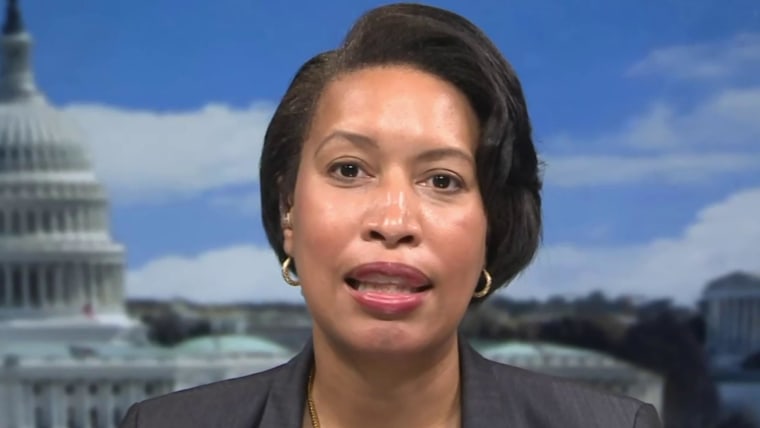A new push from House Democrats, which President Joe Biden endorsed Tuesday, has rekindled the debate over whether to admit the District of Columbia to the union as the 51st state.
Not surprisingly, given the potential for two new Senate seats at play, feelings about D.C. statehood have divided neatly along partisan lines.
The latest salvo came April 13 when 22 Republican state attorneys general sent a letter to Biden and congressional leaders opposing statehood on a combination of practical, policy and constitutional grounds. Leaving aside the letter's curious whitewashing of D.C.'s history of slavery — they write that "for over two centuries, the District's residents have all willingly lived there" — it offers two arguments for why Congress can't admit D.C. without a constitutional amendment. Neither are particularly impressive.
First, they claim, Congress lacks the power to reduce the size of the country's capital by statute. Second, land that was ceded by a state to the federal government (as present-day D.C. was by Maryland) can't become a new state without the old state's consent. A look at both the Constitution's text and D.C.'s history quickly shows why these arguments are specious at best.
Article I, Section 8 of the Constitution — the provision enumerating Congress' regulatory powers — gave the legislature the power to "exercise exclusive legislation in all cases whatsoever, over such district (not exceeding ten miles square) as may, by cession of particular states, and the acceptance of Congress, become the seat of the government of the United States." Thus, the Constitution does not say where or how large (aside from putting the cap at 10 square miles) the capital would be. The Constitution's framers intentionally punted, delegating both of those determinations to Congress.

That's where the history comes in. As the hit musical "Hamilton" recounts in the show-stopping number "The Room Where It Happens," Congress first addressed these questions in the Residence Act of 1790. In exchange for federal assumption of the states' Revolutionary War debts, Congress agreed to locate the capital somewhere along the Potomac River at a spot to be selected by commissioners appointed by President George Washington.
One year later, Congress ratified the commissioners' recommendation that the seat be established on a 100-square-mile plot of land ceded by both Maryland and Virginia at the confluence of the Potomac and Anacostia rivers. By statute, Congress chose not only where the "seat of government" would be, but how large it would be, too.
Feelings about D.C. statehood have divided neatly along partisan lines.
This background notwithstanding, the letter from the state attorneys general argues that the Constitution "does not provide authority for Congress to unilaterally alter the size of the District through simple legislation." In other words, once Congress fixed the location and the size of the "seat of government" in 1791, it could be changed only by constitutional amendment.
But that argument is belied by both the text of the Constitution (which, again, sets only the maximum size of the federal district) and historical practice. In 1846, at least in part to protect slaveowners from the impending abolition of slavery in D.C., Congress agreed by statute to retrocede to Virginia its part of the District of Columbia. That decision is why the "seat of government" is, by statute, not 100 square miles but closer to 68, giving it that incomplete diamond shape. Just as nothing stopped Congress in 1846 from shrinking the seat of government, nothing in the Constitution would prevent Congress from shrinking it further.

Even the 23rd Amendment, which is commonly described as providing three electoral votes to the District of Columbia, in fact provides them to the "District constituting the seat of Government of the United States" — the same vague language as Article I. If Congress were to shrink the "seat of government" to a small enclave around the Capitol and the White House, nothing in either Article I or the 23rd Amendment would be offended. And to smooth out any practical (but not constitutional) concerns, the leading proposal for D.C. statehood would have Congress subsequently take up a proposal to repeal that amendment once it no longer serves a purpose.
The other argument offered in the letter is even more risible. Quoting Article IV of the Constitution (which forbids the creation of a state from territory of another state without the latter's permission), the attorneys general argue that "it is not clear that Maryland ceded its territory with the intention of that territory someday becoming a state of its own."
If the letter's authors were correct on this front, at least six of the states they represent would themselves have been admitted unconstitutionally.
In other words, the letter reads the Constitution as requiring an existing state to consent not only to the original cession of its territory to the federal government, but also to the subsequent admission of any new states from that territory. Textually, this reading is nonsense. The whole point of Article IV is to delineate the only circumstance in which a state's consent is necessary to form a new state — when the latter is carved directly out of territory the former still controls (as when Virginia consented to Kentucky's admission in 1791).
If the letter's authors were correct on this front, at least six of the states they represent would themselves have been admitted unconstitutionally. Alabama and Mississippi include territory that once belonged to Georgia and South Carolina, Ohio and Indiana include land that was previously claimed by multiple states (including Connecticut and Virginia), and Kansas and Oklahoma include parts of old Texas that were ceded to the federal government in 1850.
It's understandable that passions are running high on this issue. But as the chief law enforcement officers of their states, these attorneys general have an obligation beyond their political agenda — to not advance constitutional arguments that are so weak as to imply bad faith. D.C. statehood may be politically divisive. But if crafted correctly, a statute that reduces the size of the "seat of government" and admits the rest of the present-day District of Columbia as the 51st state shouldn't raise any constitutional hackles.

